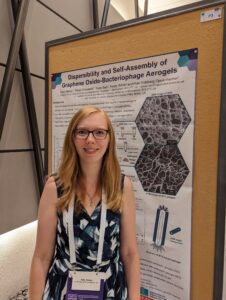Kate Stokes
 What is your current job / programme of study?
What is your current job / programme of study?
Postgraduate (EngD) student in the Formulation Engineering CDT.
What A-Levels (or equivalent) did you do?
Physics, Chemistry and Maths. I also did an AS Level in Further Maths and an EPQ.
Why did you chose a career in Materials Science and Engineering (MSE)?
I wanted a career where I could produce something tangible that would make a difference in everyday life, and I found the concept of nanomaterials and how their properties vary from normal materials really interesting. I also wanted to work on something that I could talk about with my family of non-scientists. “Making materials and devices to diagnose cancer”, easy to explain. Quantum mechanics, not so much!
What did you enjoy most about your MSE course? (If you didn’t do a MSE course which course did you do and what led to you MSE?)
I did my undergraduate degree in Physics. I was convinced I wanted to go into particle physics since I enjoyed that so much at A-Level, but after one particle physics module I realised it wasn’t for me. One of the internships I managed to get during the summer involved working with microscopes, lithography and nanomaterials and I absolutely loved it. From then on, I knew I wanted to go into materials science and engineering, so I chose all the materials-based modules I could and in my final year I applied for nanomaterials-based PhDs.
What is your research about?
My research involves making different materials and structures by combining nanomaterials with viruses. Hopefully we’ll be able to use them in applications like energy storage and sensing, but we’ll see how the experiments go!
What is the coolest thing you have done in your career so far?
Seeing my name published on a science paper was definitely a “wow” moment for me!
What do you see yourself doing in the future?
I can see myself going into the materials industry, doing something like manufacturing new medical devices or materials to withstand really high temperatures for fusion energy.
What is your favourite material (and why)?
I know this is quite a common answer, especially for someone who works in nanomaterials, but I find graphene amazing! I love how they basically discovered it by peeling away a layer of graphite with Sellotape and it turned out to be a really cool material which is transparent, strong and highly conductive. The potential uses of graphene are endless, and I can’t wait to see what we’ll be able to use it for in the future.
What advice would you give your 16 year old self?
Give yourself a break and look after yourself! It’s only very recently I’ve learnt that sometimes taking a break to relax or do some exercise and give your brain a rest before coming back to a problem is sometimes the best thing you can do.
Links

